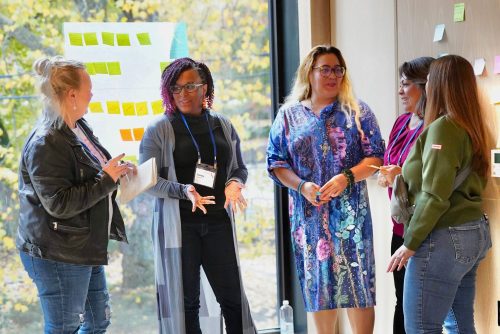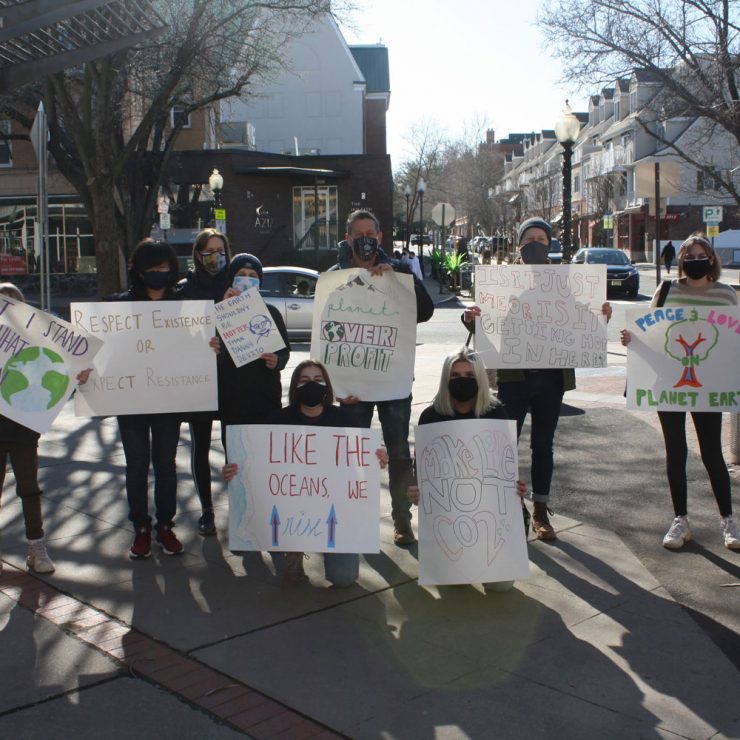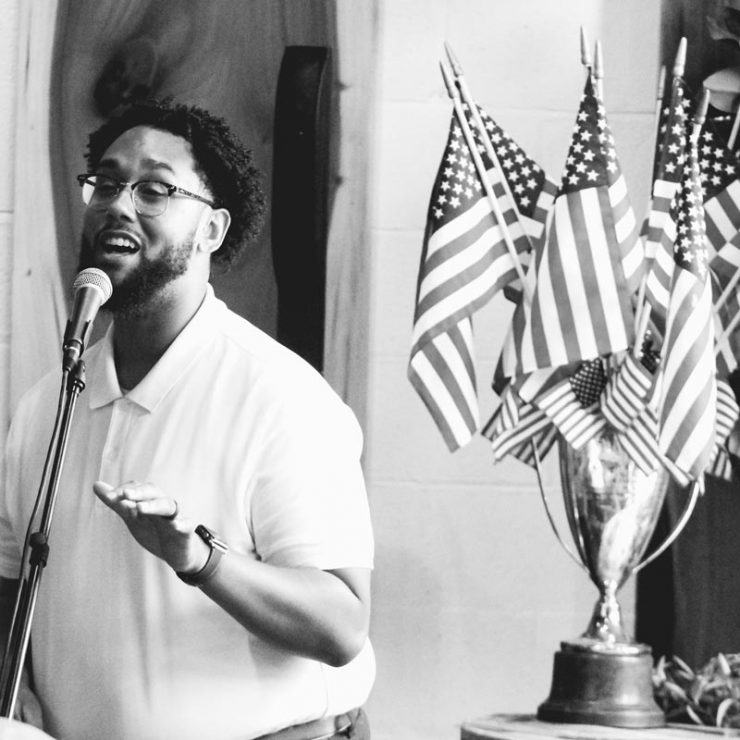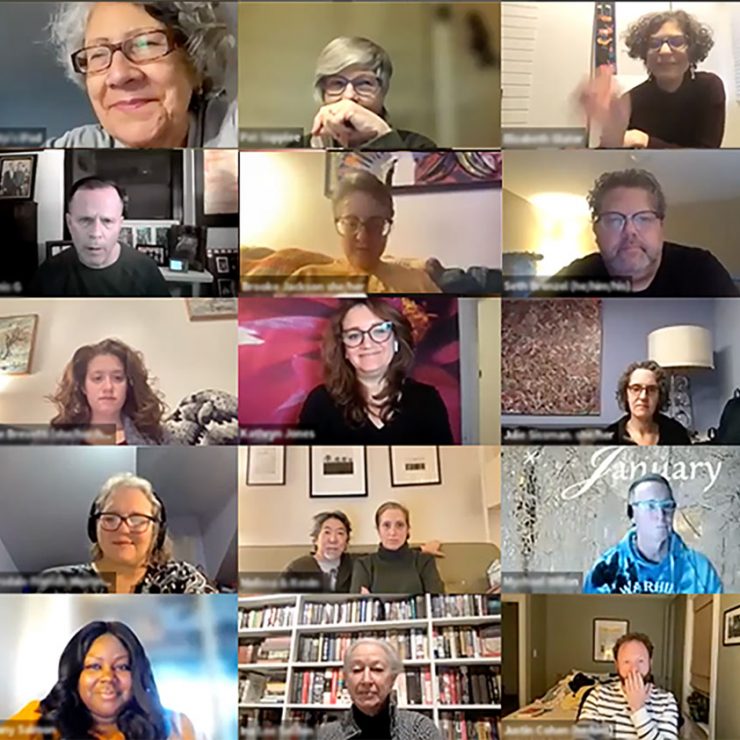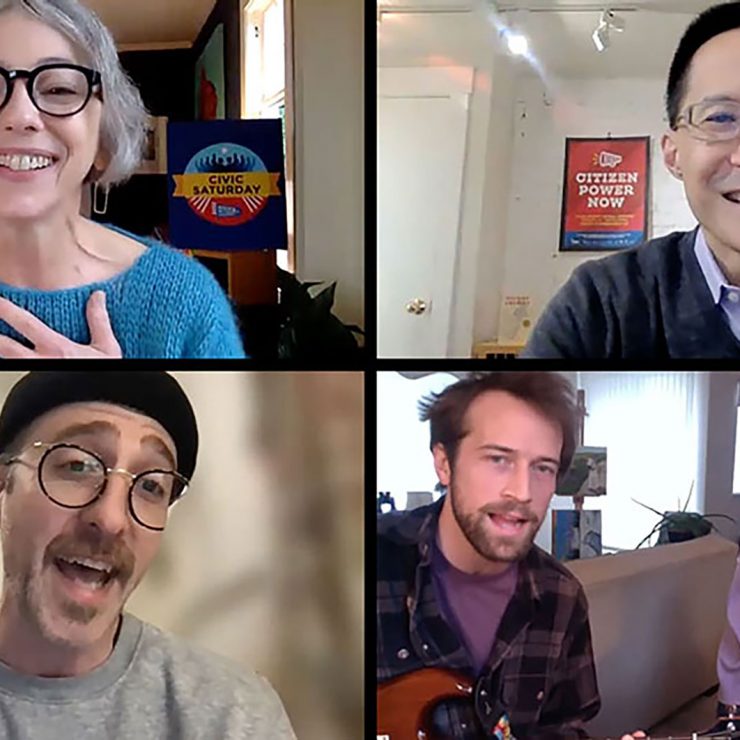Hosting a Civic Saturday gathering can feel daunting — from knowing who to bring together, to figuring out how to tailor the program to inspire your community.
Fortunately, the nation-wide community of Civic Saturday Fellows abounds with ideas and advice. We reached out to a few seasoned Fellows and asked some of the common questions we’ve heard. The ideas below are excerpted from conversations we had with them about their experience.
Meet the Fellows
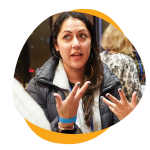
My name is Aanchal Dhar and I was in cohort 9. My first two gatherings were virtual, and I brought together friends, family, colleagues, neighbors, and people from around the country. My third gathering was in person, and I co-hosted it with another Civic Saturday Fellow in San Francisco.
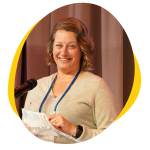
I’m Erika Olson from cohort 10. I live in Bothell, which is just northeast of Seattle. I’ve been hosting Civic Saturdays at a bookstore, at a church, and now at libraries. I always do my gatherings in series of three. I do civic health, civic infrastructure, and civic action. I may change the tagline, I may change the public theme, but it’s really the same three themes over and over again.
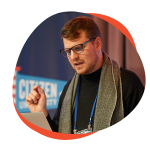
My name is Ian McPherson of cohort 18. I live in Durham, North Carolina, but work in Raleigh. And I have hosted a couple of different gatherings, one of which was in the church that I serve. We did a Civic Wednesday, where we gathered on a Wednesday night and sort of co-opted the programming for that night to introduce folks to Civic Saturday as a liturgical structure. Another I’ve hosted was in Burlington, North Carolina, which is a small town, in a part of the state that is a hotbed of white nationalist organizing. We came together and reflected on how to talk to folks across difficult chasms of disagreement. And so that was a really powerful conversation, to speak to folks who really are on the front lines of many of these civic fractures that we have in the United States as a whole.
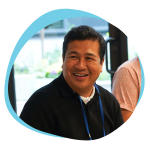
I’m Dr. Joel Domingo and I was in cohort 6. I’ve hosted Civic Saturdays in collaboration with some other local Fellows in the Seattle area at a local library. We do our gatherings as a series so it’s something the public knows will be consistent throughout the year. The gatherings are small, but that’s a good thing; it’s a time when people really get to know each other.
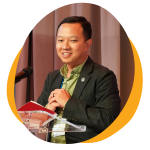
My name is Samuel Tsoi of cohort 6. I held a series of virtual gatherings in 2020. It was very, very meaningful; there was definitely a collective need to have a space like this. Before I started designing the gatherings, I didn’t know I could incorporate so much art, because I’m not an artist myself. Music is moving, and if you can sing together, there is power in just connecting with folks at that level.
Starting with the need
How have you “read your community” to understand what they need from Civic Saturdays? How have you designed and framed your gatherings to meet those needs?
Erika: For every gathering, I’ve shared a survey. Sometimes I don’t get a lot of feedback, but sometimes I do get really, really valuable feedback. For instance, one of the things that people want is more conversation time. So I’ve cut out a reading or poem depending on the subject, but really prioritized that conversation time because that’s what people are really asking for.
Ian: My community is a stone’s throw from a university. There are very well educated, very well informed folks who consider themselves to be civically engaged, but operate with a lot of burnout and despair with the scale of the issues that they’re thinking about and trying to address together. And so we’ve really focused on hope — in the face of overwhelming, insurmountable despair. We’ve focused on building resilience civically and spiritually, and to roll up their sleeves and keep fighting for an American Dream that few of them would realize in their lifetime.
Samuel: From my own journey as a person of faith, I’ve had to wrestle how my own church institution has either done civic things very narrowly or have been apathetic. I also noticed a lot of people in my generation are yearning for a more thoughtful and less contentious way of integrating faith and politics. I wanted to be able to bridge between spirituality and civics — and Civic Saturday helped me borrow and use spiritual technologies to be able to facilitate that type of conversation.
A frame for the gathering
We’ve been using four ways of describing the purpose of gatherings: a civic starting point; a refueling station; a space for community celebration; or a place for making sense of things. Do any of these resonate with how you’ve approached yours?
Erika: I would say mine falls more into the category of “making sense of things.” What I’m finding is that people can be very well intentioned, but not know where to put their energy and not know how to plug in. People seem to want to wait to be invited to action. And so I see my civic Saturdays as the place for people to connect with each other and hopefully find their way into whatever it is that’s going to be most meaningful for them — finding their way to act based on their own interests, their own talents, their own motivations.
Joel: I think it goes back to knowing what your community needs, so ours vary. The focus tends to lean more towards “community celebration,” even though some of the other elements are present. And maybe next week, we use it as a “civic starting point” for having a conversation about what it means to be an active citizen, here in America.
Ian: A place for “making sense of things” comes to mind. The overwhelming sense that folks are experiencing means that they feel rather depleted spiritually, morally, ethically, civically, and so to have a place that offers not just a sense of critique, but offers a place for connection and celebration of what’s possible, is really critical. So much of our civic and political conversation tends to go right to critique, because that’s the mode of being that we are very comfortable with. Folks are very critical of the idea of the American dream; they’re very critical of even the idea of something generative in patriotism, or civic pride. And so, helping us to reconnect to those values, in ways that are expansive enough for them to latch on to, or find room within, is really critical. Making sense of things leads to refueled commitment, and without being burdened or having criticism getting in the way, they can do the work that they feel called to do in the world.
Making sense of things leads to refueled commitment.
Samuel: I was really caught up by all the weighty questions about the downfall of democracy and how we need to rebuild it. I didn’t set out to celebrate, but it ended up being very celebratory. I surprised myself with how much art I included in my gatherings, since I am not an artist myself. A dancer I know made a video to use dance to inspire people to vote. Using the arts tells stories about who we are, which gives us new ways of making sense of things.
Sparking civic faith
How do you use or adapt language around civic faith in your gatherings?
Ian: Because of the abuse that we see in the public sphere of faith as a weapon, as a source of division, or oppression even, it takes a lot of openness. The ways that I’ve been able to connect with folks is around values — their sense of calling in the world. They feel ownership because of the work that they’re already doing in the world, and the sense of deep moral and ethical commitments that they already carry. And so everyone has a sense of civic faith within themselves, even if they resist that language to express it. So it takes some bridging from where they are and how they would express it — and giving language to their sense of call and purpose and action in the world.
Erika: Because my gatherings are in a library, we don’t use any of the faith language, as it was something that my librarians made very clear was a no-go. Instead of a civic sermon, we have civic remarks. And instead of scripture, we have readings. But what I have found is that the feeling of the gathering is not affected by that language change. It still gives you that sense of fellowship, it still gives you that sense of stepping outside of your everyday concerns and into sort of a higher plane of thinking.
Joel: For one community where we did a Civic Saturday, a lot of the people didn’t have a faith tradition going in. To use a faith word, there’s a concept called incarnation, which really means to take up the image, the stories, the narratives of that local context, and make it and translate it to the concepts that you’re trying to convey. So we translated these concepts of participatory democracy and what being a citizen means, into ways that they can understand.
Connecting and inviting
How have you promoted your gatherings and encouraged people to come and actively participate?
Erika: I have my own email list that I’ve just developed over time of anyone who’s ever come who says they want to be on the list. And I do some personal follow ups and personal invitations, where I think that the subject matter is going to be particularly relevant for someone. One that’s coming up is about civic infrastructure, and we’re talking about using public spaces for civic good. So I’m inviting a woman who has a group called Thoughtful Citizens that does service projects. They’re making cards for senior citizens, and they’re making scarves for the local homeless shelter. She uses a public space to do all of her gatherings — and she wouldn’t be doing it if she didn’t have access to that space. So I’ve invited her to come and have a couple of minutes to talk about how she uses that space.
Aanchal: I’ve partnered with a bunch of organizations, because there’s no way that we could have recruited that many people for those gatherings. They helped make marketing materials. For one gathering, we were at a LGBTQIA+ social club in San Francisco, and there was an open bar at the end of it. We ended up staying for four hours. The gathering was supposed to be like two hours, but people stayed and it was so much fun!
The last word
Do you have any other advice for your fellow Fellows?
Ian: There’s a great line from Mary Oliver that says, “I tell you this to break your heart, by which I mean only that it break open and never close again to the rest of the world.” In a moment when there’s a lot of heartbreak and a lot of civic unrest and distrust and anxiety, taking your broken heart to a place — and where they can bring theirs — really opens up new possibilities, new visions, new sense of purpose and connection. When we bring our brokenness together, it is possible. Stay brokenhearted but stay open.
Aanchal: Reach out to other fellows for help. I asked Shamichael Hallman if he would be my mentor. He stepped in to be co-host for my first gathering. So reach out, ask for help! And embrace experimentation.
The bottom line? Collaborate. Whether that’s co-hosting with fellow Fellows in your area, to finding organizational partners, to asking a Fellow to be a mentor… this community is strongest when we’re working together.
